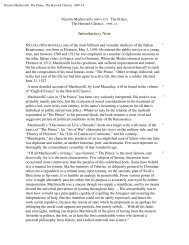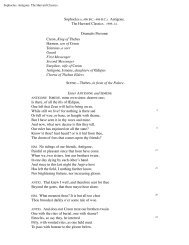Notre Dame de Paris - Bartleby.com
Notre Dame de Paris - Bartleby.com
Notre Dame de Paris - Bartleby.com
Create successful ePaper yourself
Turn your PDF publications into a flip-book with our unique Google optimized e-Paper software.
<strong>Paris</strong>, so gloriously endowed with the revenues of seven noble bailiwicks? Can you conceive of anything<br />
more gratifying than to mete out judgment and sentence, as Messire Robert d’Estouteville did every day<br />
in the Grand Châtelet, un<strong>de</strong>r the wi<strong>de</strong>, low-pitched Gothic arches of Philip Augustus; and to retire, as he<br />
was wont, every evening to that charming house in Rue Galilée, within the purlieus of the Palais Royal,<br />
which he held by right of his wife, <strong>Dame</strong> Ambroise <strong>de</strong> Loré, where he could rest from the fatigues of<br />
having sent some poor <strong>de</strong>vil to pass the night on his part in that “little cell of the Rue <strong>de</strong> l’Escorcherie,<br />
which the provosts and sheriffs of <strong>Paris</strong> frequently used as a prison—the same measuring eleven feet in<br />
length, seven feet and four inches in width, and eleven feet in height?” 62<br />
And not only had Messire Robert d’Estouteville his special jurisdictional offices as Provost of <strong>Paris</strong>, but<br />
also he had his seat, with power over life and <strong>de</strong>ath, in the King’s Supreme Court. There was no head of<br />
any account but had passed through his hands before falling to the executioner. It was he who had<br />
fetched the Comte <strong>de</strong> Nemours from the Bastille Saint-Antoine, to convey him to the Halles; he who had<br />
escorted the Comte <strong>de</strong> Saint-Pol to the Place <strong>de</strong> Grève, who stormed and wept, to the huge <strong>de</strong>light of<br />
Monsieur the Provost, who bore no love to Monsieur the Constable.<br />
Here, assuredly, was more than sufficient to make a man’s life happy and illustrious and to merit some<br />
day a noteworthy page in that interesting chronicle of the Provosts of <strong>Paris</strong>, from which we learn that<br />
Oudard <strong>de</strong> Villeneuve owned a house in the Rue <strong>de</strong>s Boucheries, that Guillaume <strong>de</strong> Hangast bought the<br />
great and the little Savoie mansion, that Guillaume Thiboust gave his houses in the Rue Clopin to the<br />
Sisters of Sainte-Geneviève, that Hugues Aubriot lived in the Hôtel du Porc-epic, and other facts of a<br />
domestic character.<br />
Nevertheless, in spite of all these reasons for taking life easily and pleasantly, Messire Robert<br />
d’Estouteville had risen on the morning of January 7, 1482, feeling as sulky and dangerous in temper as a<br />
bear with a sore head; why, he would have been at a loss to say. Was it because the sky was gloomy?<br />
because the buckle of his old sword-belt—another relic of Montlhéry—was clasped too tight, and gir<strong>de</strong>d<br />
up his fair, round, provostorial port in all too military a fashion—or because he had just seen a band of<br />
tattered varlets, who had jeered at him as they passed below his windows walking four abreast, in<br />
doublets without shirts, in hats without brims, and wallet and bottle hanging at their si<strong>de</strong>s?<br />
Or was it the vague premonition of the loss of those three hundred and seventy livres, sixteen sols, eight<br />
<strong>de</strong>niers, of which in the following year the future King Charles VIII was going to dock the revenues of<br />
the Provostry? The rea<strong>de</strong>r may take his choice, but for our part we are inclined to the opinion that he was<br />
in bad temper because—he was in a bad temper.<br />
Besi<strong>de</strong>s, it was the day after a holiday, a day distasteful to everybody, especially to the magistrate<br />
whose business it was to sweep up all the dirt—literally and figuratively—which a <strong>Paris</strong> holiday<br />
inevitably brings with it. Then, too, he was to sit that day at the Grand Châtelet; and we have noticed that<br />
the judges generally manage that their day of sitting shall also be their day of ill-humour, in that they<br />
may have some one on whom conveniently to vent their spleen in the name of the King, justice, and the<br />
law.<br />
The sitting, however, had begun without him. His <strong>de</strong>puties in civil, criminal, and private causes were<br />
acting for him as usual; and by eight o’clock in the morning, some scores of townsfolk, men and women,<br />
crow<strong>de</strong>d up between the wall and a strong barrier of oak in a dark corner of the court of the Châtelet,<br />
were blissfully assisting at the varied and exhilarating spectacle of the law, civil and criminal, as<br />
administered by Maître Florian Barbedienne, examining judge at the Châtelet, and <strong>de</strong>puty for Monsieur










